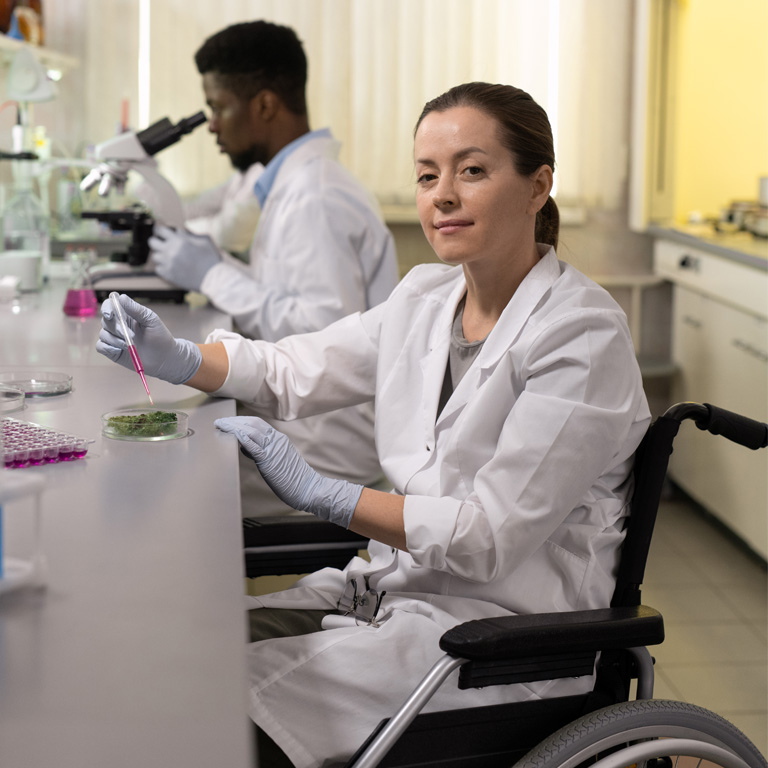What is it?
The Mission from MaRS Climate Technology Venture Diversity Award has been awarded to two early-stage ventures that have the potential to greatly reduce GHG emissions and are founded by leaders from one of four designated diversity groups: A racialized group, people living with disabilities, Indigenous peoples and individuals who identify as women, 2SLGBTQ+, and/or are gender diverse.
The winners have each received a cash prize of $75,000 to support their growth journeys and were celebrated at MaRS Climate Impact.
What is it?

The Challenge
Canadian cleantech entrepreneurs are leaders on the world stage, yet, data (1, 2, 3) shows that ownership of small and medium-sized enterprises (SMEs) in cleantech is significantly less diverse compared to SMEs in other technology industries.
When looking at ownership of cleantech SMEs in Canada:
are majority owned by women
other sectors
are majority owned by members of racialized groups
other sectors
are majority owned by Indigenous Peoples
other sectors
are majority owned by people with disabilities
other sectors
are majority owned by members of the 2SLGBTQ+
other sectors
The Challenge

Criteria
Program Eligibility
The award winner will be selected based on the following:
- The potential of the venture’s solutions to reduce GHG emissions.
- The value proposition of its solution.
- Its diversity, equity and inclusiveness (DEI) strategy.
In order to be eligible, the applicant of the venture must:
- Be a corporate leader in the Company.
- The company must be a registered Canadian business engaged in climate technology. For the purposes of this Award, “climate technology” refers to physical or digital technologies that are explicitly focused on reducing GHG emissions and/or addressing the impacts of global warming.
- Regularly engage in technological innovation at the company.
- Submit a full application in a manner consistent with the Official Rules.
- Be from one or more of the following four designated diversity groups:
1. Member of a racialized group:
- Refers to persons, other than Indigenous peoples, who are non-Caucasian in race or non-white in colour. Examples of racialized groups include, but are not limited to: South Asian, Chinese, Black, Filipino, Arab, Latin American, Southeast Asian, West Asian, Korean, and Japanese.
2. People with disabilities:
- Refers to people who are living with a long-term or recurring physical, mental, sensory, psychiatric, or learning challenge and who:
- Consider themselves to be disadvantaged in employment by reason of their condition, or;
- Believe that an employer or potential employer is likely to consider them to be disadvantaged in employment by reason of that condition, and;
- Includes persons whose functional limitations owing to their condition have been accommodated in their current job or workplace.
3. Indigenous peoples:
- Refers to persons who are First Nations, Métis, and/or Inuk (Inuit).
4. Individuals who identify as women, 2SLGBTQ+, and/or are gender diverse:
- Women refers to individuals who identify as women;
- 2SLGBTQ+ refers to individuals who identify as Two Spirit, Lesbian, Gay, Bisexual, Trans, Queer (or Questioning), Intersex, and/or Asexual, and;
- Gender diverse refers to individuals whose gender identity or gender expression does not conform to the socially-defined gender binary framework
In addition to the applicant’s eligibility, the company should:
- Own the intellectual property of any technology relevant to the application.
- Not be a subsidiary of a larger parent company that would otherwise not be eligible for the award.
- Have the potential to significantly reduce GHG emissions.
- Be proprietary and/or patentable.
- Have the potential to be scaled globally for major impact.
- Be a small and mid-sized enterprise (SME) as defined by Innovation, Science and Economic Development (ISED) Canada, and;
- Fall within TRL3 and TRL5 on the nine-point Technology Readiness Level spectrum – as defined below:
- TRL 3: Active research and development is initiated.
- TRL 4: Basic testing to validate the technology in a laboratory/controlled setting.
- TRL 5: Component and/or validation in a simulated environment.

